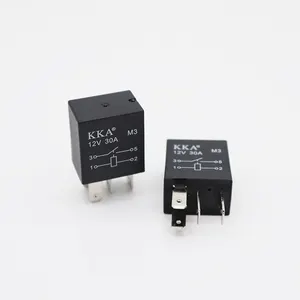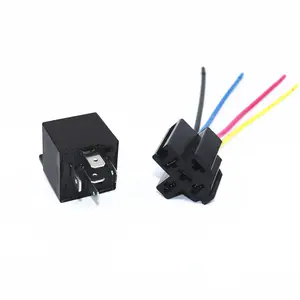
KKA-M3 30A Mini Automotive Relay 12V/24V 4pin/5pin Car Relay/Auto Relay For Car Motorcycle Boat Auto Vehicle

12V/24V Automotive Relays Fixed Back 5-pin Conversion 40A /80A/100A AC Relay Automotive Car Relay




















The 24V flasher relay is an essential component in various electrical systems, designed to control the operation of turn signals and hazard lights in automotive applications. This electromechanical device ensures the consistent blinking of lights, crucial for signaling and safety on the road. Its application, however, extends beyond vehicles, serving an important role in industrial and domestic circuits.
There is a diverse array of 24V flasher relays available to meet specific requirements. Types include time delay, latching, solid state, and sequential relays, alongside the common automotive variety. Pin configurations also vary, with 4 pin, 5 pin, 6 pin, and 8 pin options to accommodate different circuit designs. Each type offers unique features, such as the solid state relay's resistance to wear due to the absence of moving parts, or the latching relay's ability to maintain its state after being actuated.
The primary application of a 24V flasher relay is in the automotive industry, where it plays a pivotal role in vehicle light signaling systems. However, its use is also found in power systems, appliances, and other areas where a low power signal needs to be amplified to control a higher power circuit. The advantages of using a 24V relay include its ability to handle high current loads, providing reliable performance in a compact form factor.
The construction of a 24V flasher relay involves various materials, including copper coils, a metal armature, and contact points often made of durable alloys. The choice of materials ensures the relay's longevity and consistent performance under repetitive use. Solid state relays, in contrast, utilize semiconductor materials to perform their switching functions, offering a different set of advantages such as silent operation and reduced maintenance.
Selecting the appropriate 24V flasher relay requires consideration of the load it needs to control, the environmental conditions it will operate in, and the specific circuit requirements. For instance, a relay for a high-vibration environment like an automobile may need to have robust construction to prevent contact chatter, which could lead to signal inconsistency.
In addition to the relays themselves, compatible accessories such as 24V flasher relay clips are available to ensure secure mounting and easy installation. When integrating a relay into a system, it is crucial to ensure compatibility with the existing components to achieve optimal functionality.